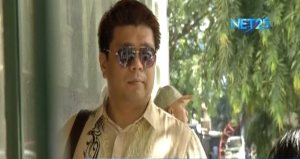
(Eagle News) – The Court of Appeals has upheld its earlier decision dismissing the plea for protection of expelled Iglesia Ni Cristo member Lowell Menorca II and his family against the INC for lack of merit and for being moot and academic.
In a three-page resolution, the CA’s Seventh Division dismissed the motion for reconsideration filed by Menorca’s brother, Anthony, and his sister-in-law Jungko Otsuka for lack of merit, thus affirming its decision last April to dismiss the case.
In its April 21, 2016 decision, the CA said that “proceeding with the case would merely waste the valuable time and resources of the court.”
In the appealed resolution, the appellate court noted that the Menorca and the petitioners themselves have admitted that the Menorca family had already left the premises of the INC Central Compound on Oct. 22, 2015, prior to the issuance of the writ of amparo on October 23, 2015.
On Tuesday (October 4), the appellate court said no new issues were raised in the motion for reconsideration that would cause the reversal of its earlier decision.
“After due consideration, it has become manifestly clear that petitioners’ arguments are mere reiterations of points and issues which were discussed and addressed in the Resolution sought to be reconsidered and since no new matter and argument had been raised, we find no cogent reason to justify the modification, amendment or reversal of our ruling,” said the appeals court in its resolution penned by Associate Justice Victoria Isabel A. Paredes.
“The judgment will not serve any useful purpose or have any practical legal effect because, in the nature of things, it cannot be enforced,” it said.
The court said that there was “no longer any justiciable controversy to speak of” so there was no reason for them to tackle questions that have become moot and academic.
The Menorca’s petition was filed in October 2015 against the officials of the INC’s church administration.
But Menorca, a few months later, went to Vietnam with his family without informing the CA. This was in March when hearings were already scheduled where he was supposed to appear and answer the INC’s counter to his petition.
In its latest resolution, the CA stressed that “courts have no authority to pass upon issues through advisory opinions or to resolve hypothetical or feigned problems.”
Menorca had been repeatedly claiming before the press last year until he left in March 2016 that his life was constantly in danger. But the INC claimed that these “threats” were just all in Menorca’s mind, a product of his alleged wild imagination (guniguni).
In its April 2016 resolution, the CA also noted that the petitioners’ (Menorca’s) statement “confuses fear for threats.”
The court was referring to the petitioners claim that there were threats to the lives of Menorca’s family members, and that the possibility of Lowell Menorca “being hauled off to jail again exponentially increased with the filing of cases against him.”
It observed that Menorca’s fear was “unfounded” as the various criminal cases filed against him, including adultery and libel, were all “bailable offenses.”
The CA said that Menorca and his family’s departure from the country in the middle of hearings was the “supervening event” which rendered the amparo plea moot and academic.
“Here, the supervening event is the Menorca family’s leaving the country; and since they are supposedly the only true beneficiaries of the instant petition, proceeding with the case would merely waste the valuable time and resources of the court,” the appeals court said.
“The actual substantial relief which the petitioner would be entitled to, i.e. the preservation of the quality of the right to life, liberty and security afforded by the writ of amparo cannot be enforced beyond the territorial jurisdiction of the Court,” the CA’s decision added.
Menorca has been expelled for violating the INC’s doctrine on church unity. Menorca was then a church worker. He has not yet passed the requirements to be a minister contrary to other news reports.
The CA noted how Menorca repeatedly failed to attending hearings for his cross-examination.
It then later learned that he had left and there was no definite date for his return.
In dismissing Menorca’s plea for amparo, the court stressed that the “writ of amparo is confined only to cases of extrajudicial killings and enforced disappearances, or to threats thereof.”
“Considering that this remedy is aimed at addressing these serious violations of or threats to the right to life, liberty and security, it cannot be issued on amorphous and uncertain grounds, or in cases where the alleged threat has ceased and is no longer imminent or continuing,” the appellate court said in its April 2016 dismissal of Menorca’s petition.
The appellate court’s resolution affirming its earlier dismissal of the case was also signed by Associate Justices Magdangal M. De Leon and Elihu Ybañez of the CA’s seventh division.








